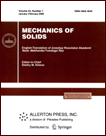 | | Mechanics of Solids
A Journal of Russian Academy of Sciences | | Founded
in January 1966
Issued 6 times a year
Print ISSN 0025-6544
Online ISSN 1934-7936 |
Archive of Issues
| Total articles in the database: | | 13427 |
| In Russian (Èçâ. ÐÀÍ. ÌÒÒ): | | 8178
|
| In English (Mech. Solids): | | 5249 |
|
| << Previous article | Volume 37, Issue 5 / 2002 | Next article >> |
| A. A. Pan'kov, "Variances of strains in phases of elastic composite materials with random structures," Mech. Solids. 37 (5), 38-55 (2002) |
| Year |
2002 |
Volume |
37 |
Number |
5 |
Pages |
38-55 |
| Title |
Variances of strains in phases of elastic composite materials with random structures |
| Author(s) |
A. A. Pan'kov (Perm) |
| Abstract |
We present statements and solutions of new averaged boundary-value
problems of the generalized self-consistent method [1,2]
for calculating stress and strain variance fields
in the phases of combined or hollow inclusions in terms
of prescribed uniform microstrain fields and unconditional
one-point
central moments of microstrains in a composite
material [3-10]. (See also M. G. Tankeeva, A. A. Tashkinov,
Yu. V. Sokolkin, and A. M. Postnykh, A Structural-phenomenological Approach
to the Strength Analysis of Anisotropic Composite Structures. Preprint
[in Russian], UrO AN SSSR, Sverdlovsk, 1989.)
The variance fields are determined by a random distribution
of inclusions in the representative volume of the composite.
We pass from the boundary-value problem for conditional two-point
central moments of strain fields of a composite with random
structure to a simpler boundary-value problem for the respective
fields of conditional one-point moments. We show that in special
cases, to calculate, for example, the variances for the relative
change in the volume and for shear strains in inclusions of an
isotropic composite, it is sufficient to solve an averaged
boundary-value problem of elasticity. The calculation scheme
of this averaged problem involves an isolated inclusion
with an interface layer in a homogeneous medium; the elastic
properties and the size of the interface layer
take into account the specific features of the random
distribution of inclusions in terms of specific averaged
indicator functions. By the interface layer we understand a local
region of inhomogeneity of the field of elastic properties
of the averaged boundary-value problem in the neighborhood
of the isolated inclusion. The size of this layer is commensurable
with the correlation radius of the composite random structure.
The solutions of this averaged problem, for example,
for strain and stress fields correspond to one-point fields
of strain and stress central moments inside and around the
inclusions of the composite.
We present the results of the solution of test problems
and the results of the numerical analysis of statistical characteristics
of stresses and strains in the rigid phase of hollow and solid spherical
inclusions for composites with various random structures. |
| References |
| 1. | A. A. Pan'kov, "Analysis of effective elastic properties
of composites with random structures by the generalized
self-consistency method," Izv. AN. MTT [Mechanics of Solids],
No. 3, pp. 68-76, 1997. |
| 2. | A. A. Pan'kov, "A self-consistent statistical mechanics
approach for determining effective elastic properties of composites,"
Theoretical and Applied Fracture Mechanics, Vol. 31, No. 3,
pp. 157-161, 1999. |
| 3. | V. A. Lomakin, Statistical Problems in Mechanics of
Solids [in Russian], Nauka, Moscow, 1970. |
| 4. | T. D. Shermergor, Theory of Elasticity
of Microheterogeneous Media [in Russian], Nauka, Moscow, 1977. |
| 5. | I. N. Bogachev, A. A. Vainshtein, and S. D. Volkov,
Statistical Physical Metallurgy [in Russian], Metallurgiya, Moscow, 1984. |
| 6. | Yu. V. Sokolkin and T. A. Volkova, "Multipoint moment
distribution functions for stresses and strains in stochastic
composites," Mekhanika Kompozit. Materialov, No. 4,
pp. 662-669, 1991. |
| 7. | G. P. Sedneckyi (Editor), Composite Materials. Volume 2.
Mechanics of Composite Materials, Academic Press, New York, 1974. |
| 8. | S. Torquato, "Random heterogeneous media: microstructure
and improved bounds of effective properties," Applied Mechanics Reviews,
Vol. 44, No. 2, pp. 37-76, 1991. |
| 9. | Y. Benveniste, G. J. Dvorak, and T. Chen, "Stress fields in composites
with coated inclusions," Mechanics of Materials, Vol. 7, No. 4,
p. 305-317, 1989. |
| 10. | Xing-Hua Zhao and W. F. Chen, "Influence of interface layer
on microstructural stresses in mortar," Int. J. Numer. Analyt. Methods in
Geomech., Vol. 20, No. 3, pp. 215-228, 1996. |
|
| Received |
14 February 2000 |
| << Previous article | Volume 37, Issue 5 / 2002 | Next article >> |
|
 If you find a misprint on a webpage, please help us correct it promptly - just highlight and press Ctrl+Enter If you find a misprint on a webpage, please help us correct it promptly - just highlight and press Ctrl+Enter
|
|

 Russian
Russian  English
English